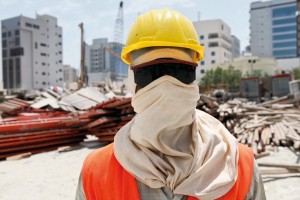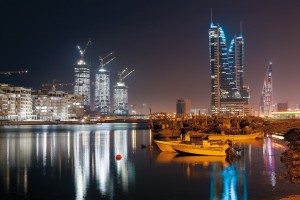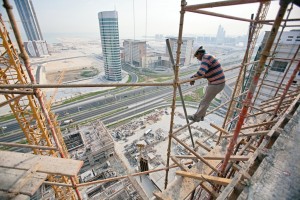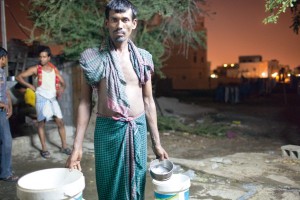Introduction

The Middle East has become famous for its images of luxury, associated with its large variety of tall and beautiful buildings. For a foreigner from the West, owning a home in Dubai and Bahrain is synonymous with the epitome of wealth and class.
Migrant workers exist in all forms of life in the Gulf, from domestic help to involvement in the running of the infrastructure and logistics of the country. An important area is the construction industry. Fueled by the oil boom, it has become a cornerstone of the Gulf economy.
Migrant issues are many, multi-layered and multi-faceted, the foremost being the abuse of migrant workers through their living and working conditions. Whilst I had read and heard stories, to see and hear firsthand a person talk of their dreams, hopes, fears, challenges and traumas in their own personal and intimate space, was a very humbling experience indeed. I saw, rather than heard, about lives building a nation.
My project allowed me to meet some inspirational people working and campaigning to raise awareness of migrant issues, some with profound impact, but the work is far from over. This project attempts to add to their work, but also to go beyond the ‘issue’.
Migrant workers contribution are unrecognised, their presence unrecognised and their rights unrecognised. In essence their humanity is unrecognised.
My aim is to give recognition to the unrecognised, to share the stories of the ‘migrant worker’, to give the ‘issue’ a human face, and to get to know the person behind the ‘headlines’.

The Gulf: a region of many dimensions
Migrant workers in the Gulf are not a new phenomenon; they have been around as far back as the 1920s. After the discovery of oil, the region saw a rapid development in its economy, and inevitably entire industries grew around the exploration of oil, the most noticeable being the construction industry.
With such rapid development, these countries, lacking a skilled local workforce, began to employ a large number of expatriate workers, and rather than complementing the local workforce, these expatriate workers began to dominate and exceed it. In 2004, the migrant labour force in all the Gulf Cooperation Council countries (GCC) was close to 70 percent. The lowest rates were recorded in Bahrain and Saudi Arabia, but still constituted above 50 and 65 percent of the workforce respectively. In Kuwait, 82 percent of the workforce was foreign, in Qatar almost 90 percent, and in the United Arab Emirates (UAE) it was also in the region of 90 percent.
Originally the workforce came from neighbouring poorer Arab states, and in the beginning they were welcomed, but as development grew tenfold in the oil-boom years, certain cultural, political, historical, economic and pragmatic factors led the ethnic makeup to change.
The GCC countries welcomed more Asian nationals into their workforce as the demand for workers far outstripped the supply that local Arab states could provide. The Asians were also cheaper and travelled alone rather than with their families.
With the de-Arabisation of the GCC workforce, a new fear arose about the loss of social customs caused by this new wave of migrants. To counter this, most GCC countries enacted a new set of labour laws. Generally these laws gave rights of employment to nationals, and maintained national privilege through a biased sponsorship system, limit on duration of work permits, curbs on naturalisation and curbs on the citizenship rights of those who had already been naturalised, but these measures brought limited results.
This inequality was further compounded by the fact that the favourable conditions enjoyed by the nationals since the oil-boom years are beginning to change. The public sector is saturated with local indigenous employees, whilst the private sector, with low salaries, long working hours, a competitive environment and usually an expatriate as a supervisor, is still unattractive for nationals. Also, nationals do not like to enter low-skilled posts, and whilst the government is addressing the skill base of its population, the education system has not properly dealt with reorienting traditional work values, and companies resent being forced to localise their workforce, arguing that it affects productivity and profitability of businesses.
All this has led to a large number of Asian migrant workers in the GCC countries, and the trend would suggest they are there to stay for a while yet.

Bahrain and its migrant workforce
Bahrain, like the rest of the GCC countries, has experienced rapid development with a large number of migrant workers. The economic development is clearly visible with the announcement of mega construction projects. The top eight projects are estimated to be at a total cost of 17.8 billion US dollars.
This serves to highlight the scale of construction development in a relatively small island such as Bahrain. Bahrain accounts for almost half a million migrant workers, of that over 120,000 are employed in the construction industry.
Mohammed Al-Binfala, who owns and runs a prominent construction company, argues that post-9/11 there has been a move towards a flow of Arab capital out of the West and into investment in the GCC countries. Prior to this, many wealthy Arabs invested in the US, but with assets being frozen whilst allegations of terrorism were investigated, many Arabs brought their wealth home.
His company is involved in three large projects in the district of Seef, one of the most affluent areas of Bahrain. These projects are valued at 16 million US dollars, 10.6 million US dollars, and 6.6 million US dollars respectively. He says there are many projects around Bahrain on this scale. This means that more labour will be urgently needed to meet the deadlines for completion of these projects. Of the 450 people he employs, only 30 are Bahraini.
Furthermore he added, “With the Iraq war, there was a surge in oil price, which resulted in surplus cash being available, and the only viable sector that they could invest in was real estate – hotel development, villas and apartments. All this development inevitably brought in lots more migrant workers, at all levels. I will not remove expats to replace them with Bahrainis, because if I need twenty workers now I will need thirty, in two years’ time. I will hire people with the skills, so if Bahraini doesn’t have the skills then I will hire expats again. With this much growth there are a lot of job opportunities here. Also the local population is growing. At the moment the population is one million, and that is expected to grow to two million in 2025. Where will all these people go? Whilst other countries have 1-2 percent growth, Bahrain has 7 percent growth.”
In the Middle East, construction workers in particular, as well as those employed in the domestic sector, are mostly Asians and are considered the most disadvantaged, and therefore the most easily exploited.
Exploitation happens for a variety of reasons, but at the core of this is the sponsorship system. For any foreign worker to come to work in the GCC states, they must do so under a sponsorship scheme. Whilst there are slight variations in the sponsorship rule in different GCC states, essentially in all countries there must be an indigenous person who applies to bring a foreigner over to work for him. This is termed the ‘Kafala system’. This means that a worker’s right to work and remain in the host country is tied to the sponsorship of his or her employer. They are not free to switch jobs and can end up being deported if they attempt to leave their employer.
This law has particularly serious implications for women working as maids, who are legally required to reside with their employer; it makes it difficult for them to leave an abusive situation. It also binds construction and factory workers to their employers. However, as of August 1, 2009, Bahrain was the first country in the region to scrap the Kafala system.
Instead, in an effort to protect migrant workers, employers must request work visas for foreigners via the Labour Market Regulation Authority (LMRA), the official sponsor of foreign workers, and migrants can turn to the LMRA for permission to change jobs after completing contracts if they find another Bahraini employer who wants to hire them.
Bahrain also requires contracts in the worker’s language spelling out job duties, hours and working conditions. Changing jobs without leaving Bahrain has become easier, and employers are required to pay migrant workers via bank deposits in order to leave a record so that wage disputes can be resolved quickly.
Whilst in theory this is seen as progressive for a country in this region, and a positive step towards trying to reduce exploitation, the system of sponsorship which exists means that in effect this is far from what happens.
Often a term that is thrown about is the ‘free visa’. In reality, such a thing does not exist, but is used to explain the illegal sponsorship system, whereby a person will come over on a sponsorship, under an assumed company, but will not be required to work under that sponsor or company. They will be set ‘free’ to find their own work.
The catch is that the sponsor charges a ‘fee’ to the visa holder. It can be any amount, but generally it is 2,500-4,000 US dollars. Once set ‘free’, these people have to look for their own employment. However, what then happens is the sponsor then reports these workers as missing. Their residency permits are then cancelled by the state, and they are now termed ‘illegal’. The sponsor is then allowed to bring in further people. When people become ‘illegal’ or run away, the sponsor does not have to pay insurance to the General Organisation for Social Insurance (GOSI). This insurance enables people to have access to many state services, including the health service, and an employee can claim back the money once they leave employment (Muhammad Ibrahim, First Secretary and Head of Labour Wing, Bangladeshi Embassy).
Marietta Dias, a founding member and head of the Action Committee of the Migrant Workers Protection Society (MWPS) in Bahrain argues. “To date there is no record of migrant workers claiming this money back. The only time they receive money is when there has been an industrial accident and that too is a long, long process. It is also important to say that it is against the law to employ free visa workers and the new employer can be made to pay hefty fines and the worker immediately deported thus incurring great financial loss to the worker.”
It is also common for the ‘free visa’ that there may be several middlemen who all benefit financially from one migrant worker. This means the migrant worker may never know who his actual sponsor is. This causes a lot of problems if the worker finds himself in trouble.
Even those workers who arrive under a legitimate sponsor may find that the salary promised is not given, or is withheld for many months. Sometimes the jobs promised are non-existent, and therefore the workers are forced to compromise and take whatever employment is on offer due to the huge financial debt they have incurred along the way with exorbitant rates of interest.
Also, on arrival, it is common practice that workers will have their passports taken away from them by their employer for ‘safekeeping’. Furthermore, construction workers are often subjected to overcrowded and unhygienic living conditions and work in unsafe conditions and extremely high temperatures. “It is no coincidence that one of the most common causes of death among perfectly healthy young men is cardiac arrest. Accidents on construction sites are also a frequent cause of death and serious injury.”
Mrs Dias furthermore added, “Most of these migrant workers are low skilled, it is therefore no surprise that these workers seldom, if ever, fight for their rights. Even if they do, the chance of their winning is very, very slim. It is rare to see a worker in possession of a legal contract of employment, and yet this is the one document the authorities demand to see if they wish to take up their rights”. Marietta Dias has spent over forty years campaigning for migrant and domestic workers’ rights, and has been awarded the 2008 Hero Acting to end Modern Day Slavery Award by the US, one of only twelve people in the world to receive it. She says, “I have handled many cases, and very few get to court, and even if it gets to court, it can take many years. Most don’t have that time.”

Conclusion
The Middle East, especially the GCC countries, is a region of great transition and change, attributed to the fast-paced development of the region, and with it has come many challenges, none more so than the reliance on a migrant workforce.
It would seem that, despite the current economic challenges, the need for construction development will exist in Bahrain for a while yet, and with it the need for migrant workers.
Bahrain, like the rest of the GCC states, has had to confront the complex and multi-faceted issues associated with migrant workers. From protectionist labour and social policies, to a fear of a lost culture due to an influx of people from other countries, to laws enacted to protect vested interests, migration in the GCC is an interesting and important topic for a variety of historical, political, social and moral reasons.
Bahrain has been at the forefront of enacting laws and scrapping of the Kafala system; yet state intervention is far from simple. The ‘free visa’ system highlights how difficult the migrant issue is in Bahrain. Workers continue to be exploited and abused, and unrecognised for their contribution to the countries they are building.
See the full photo essay on Tawhid al-Rahman's website,here
Originally written by Tawhid al-Rahman, a photojournalist based in Bahrain, and re-posted here with permission.




